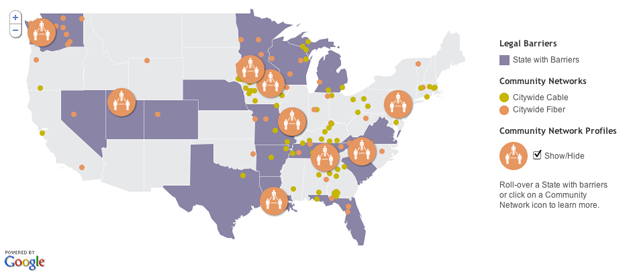Image


“We’d love to have it,” said Cris Hogan, executive vice president of Hogan & Associates Construction in Centerville. “It’s much faster, with more capabilities, and we’re hoping less expense.” As a commercial builder, Hogan’s company frequently transfers detailed documents and plans to subcontractors electronically. Under current bandwidth conditions, that process can be time consuming, he said. Hogan’s wait for screaming-fast Internet could soon be over. “No one in Centerville has Utopia right now but they’re getting close with the stimulus,” said Blaine Lutz, the city’s finance director. His workplace, Centerville City Hall, should be hooked up by October.The current expansion will connect 141 anchor institutions in the two communities as well as many more in Payson, Orem, Murray, Midvale, West Valley City, and Perry. As of now, residents generally have to pay a steep upfront $3,000 connection fee for the physical connection, but local governments are investigating different options to allow residents to connect to the network affordably, as Brigham City did with a special assessment area. As for the capacity of the network and value offering, it crushes Comcast.
These disagreements are hopelessly tangled in another argument entirely: What role should the government have in any market, let alone the broadband market? North Carolina’s state legislature just passed a law prohibiting municipal broadband services. But in the communications industry, many free-market and anti-regulatory arguments would be mooted if the market provided what is being asked for – affordable and universal access to broadband. Now, not later.Communities are not building their own networks on a lark - they do it because they have to in order to ensure their future vitality. Just last week, we also answered the same question of the role of government in broadband when revisiting an excellent commentary published years ago about the proper role of government in matters of infrastructure. We will all benefit the most when we all have access to fast, affordable, and reliable access to the Internet. But blindly relying on a few massive companies to get us there is lunacy. They simply do not have the motivation or capacity to sufficiently invest or to run the networks in such a way that all have access -- as private companies, they are supposed to maximize profit. Maximizing profit is incompatible with managing infrastructure -- pricing access to infrastructure too high results in losses for everyone, including the vast majority of the private sector. At the very least, all communities must maintain the freedom to choose locally if building a network is the right decision for them.
 Ford Foundation explores the context around the map here:
Ford Foundation explores the context around the map here:
The stakes on this issue are high, and the questions are complex—making the involvement of philanthropy especially important. Questions are emerging, for example, about the lack of market competition, and what appears to be the resulting failure to provide good service to rural and working communities. Some localities are responding by establishing municipal broadband networks that meet the infrastructure needs of their citizens and ensure that local businesses and families are not left behind. Our grantee partners are informing debates on issues like these, where the real future of Internet rights is being determined—and where the public interest can easily get lost.We look forward to seeing this map add more communities as they take responsibility for their digital future.
The first attempt at getting that approval didn't go so well in 2009. According to city records, opponents -- including the Colorado Cable Telecommunications Association -- spent $245,513 to defeat that ballot measure, the largest amount ever spent on a Longmont city election. By contrast, the city legally couldn't campaign on its own behalf, and the explanations that were out there didn't explain well, according to Longmont Power & Communications director Tom Roiniotis.The cable and phone companies created an astroturf group called "No Blank Check" that then used standard fear, uncertainty, and doubt tactics to spread misinformation around the community.
I have long been a fan of Larry Lessig's work, so I was proud to see him use our work as the foundation for his presentation at the 2011 Personal Democracy Forum. He talks about the fundamental right of communities to build their own networks as well as Time Warner Cable's successful purchase of competition-limiting legislation in North Carolina.